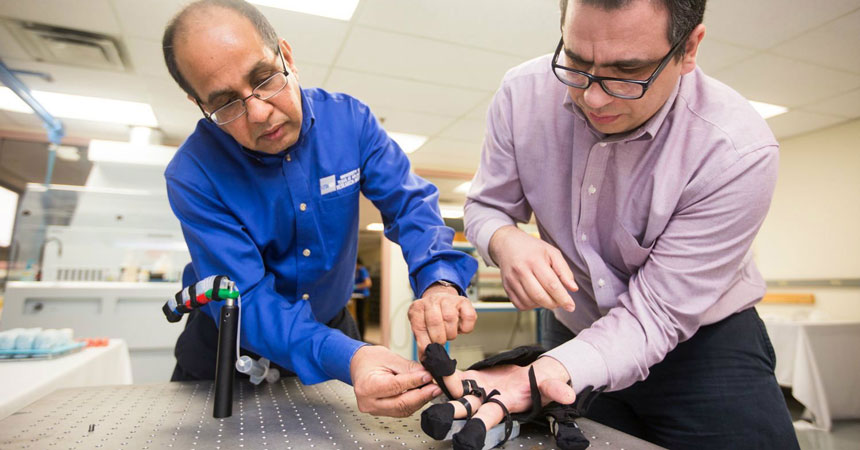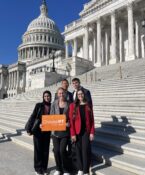UTA Research Institute partnering to develop robotic gloves for post-stroke hand rehabilitation
Media Contact: Herb Booth

The University of Texas at Arlington Research Institute is making flexible soft robotic gloves that will aid in rehabilitating stroke patients through virtual reality gaming.
Combining this glove with the virtual reality gaming to be developed by Neuro Rehab VR will enable stroke patients to engage in rehabilitation activities for regaining their hand function.
Muthu Wijesundara, left, and Mahdi Haghshenas-Jaryani, both from UTARI, work on the robotic glove that would help rehabilitate post-stroke patients. The research is being done in collaboration with the UNT Health Science Center.
The team was recently awarded a $224,893 National Science Foundation grant to use robotic-assisted, virtual reality-based therapy for stroke patients. The grant is part of the NSF’s Small Business Technology Transfer Fund and is aimed at helping technology startups commercialize products.
UTARI is partnering with Neuro Rehab VR and the University of North Texas Health Science Center.
Principal Investigator Veena Somareddy, chief technology officer and president of Neuro Rehab VR, will lead the development of the 3D virtual reality gaming environment. The UTARI team, led by co-principal investigator Muthu Wijesundara, will provide the soft robotic gloves. After development of the system, the University of North Texas Health Science Center will perform clinical testing of the device with post stroke patients.
“There currently are no products on the market that provide this fine motor training for the victims of strokes,” Wijesundara said. “This device could provide that training through therapy sessions. In addition, the system could require minimal therapist intervention and help, thus saving money on rehabilitation.”
The outpatient physical rehabilitation market is a $30 billion industry growing at a rate of 7 percent in the United States, mainly due to a growing elderly population.
Somareddy said: “The immersive experience provided by the system will encourage patients to participate in rehabilitation activities. This has the potential to increase patient compliance, which is a huge problem in current rehabilitation approaches. As robot-assisted treatment becomes widely available and accepted, the customer base will grow from acute care clinics to long-term rehabilitation centers and finally to home-based care. This robot-assisted rehabilitation market is expected to grow dramatically, reaching $2 billion by 2020 and we believe our system has a strong niche market opportunity.”
Clinical partners Rita M. Patterson and Nicoleta Bugnariu, professors of family medicine and physical therapy at UNTHSC, have been working with the team for several years. Initial research and design of this rehab glove was through a $99,000 grant from the Texas Medical Research Collaborative.
“Assistive motion provided by the glove enable patients to engage in rehabilitation activities regardless of their impairment levels,” Patterson said.
“Gamified rehabilitation activities in virtual environments are based on motor learning principles that drive neuroplasticity and allow achieving rehabilitation goals while creating an enjoyable engagement,” Bugnariu said. “Patients can engage these rehabilitation activities throughout their rehabilitation continuum.”
Mickey McCabe, UTARI executive director, said the project is a wonderful example of UTARI’s drive to develop technologies that can be commercialized in order to improve quality of life.
“This is exactly what the NSF’s Small Business Technology Transfer Fund was designed for,” McCabe said. “This work puts the rehab glove one step closer to the consumer, which is where it belongs. UTARI’s work touches lives and improves the health of so many people.”





Social media